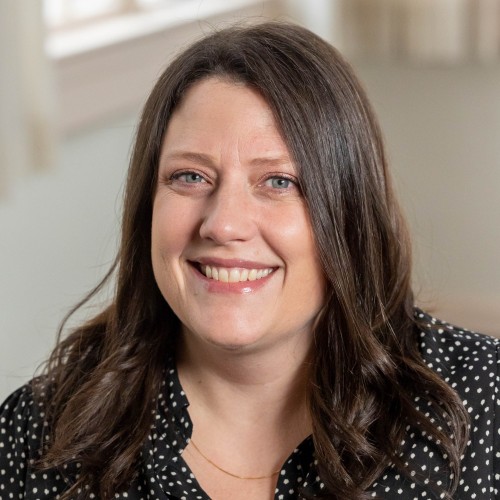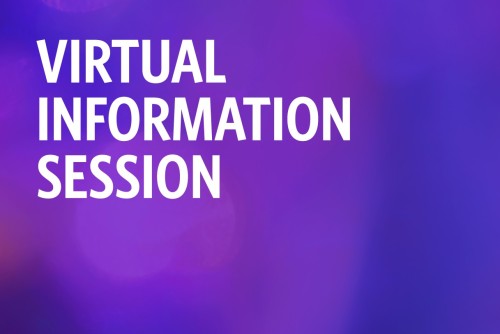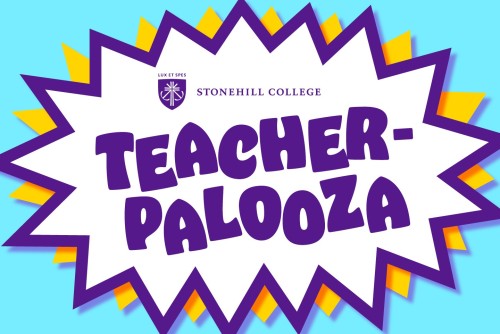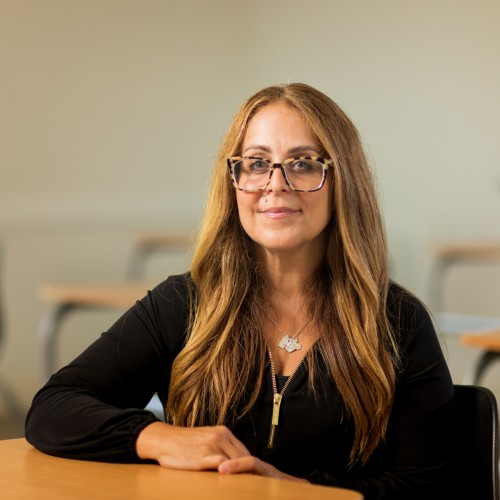Postbaccalaureate Licensure in Special Education, 5-12
Stonehill's Postbaccalaureate Licensure in Special Education, 5-12 prepares current educators who already hold a master's degree to create and lead inclusive learning environments. It leads to Massachusetts initial licensure in special education, 5-12.
Upcoming Application Deadlines
- Fall Semester: August 1, 2025
- Stonehill in Boston: August 1, 2025
- Stonehill on Cape Cod: August 1, 2025
- Spring Semester: January 1, 2026
- Summer Semester: May 1, 2026
Earn Your Initial Licensure in Special Education, 5-12
The Postbaccalaureate Licensure in Special Education, 5-12 program prepares teachers to be leaders and critical thinkers. Schools today are complex and diverse communities — reflecting a landscape rich with individual differences. Teachers in our program are prepared using a unique combination of theoretical and practical experiences. This approach ensures their ability to create and lead equitable spaces where difference is valued while at the same time preparing them for the realities and challenges of the classroom and the profession.
In this program, students will:
- develop pedagogical skills to teach diverse adolescent learners
- design and implement equitable curricula across content areas in middle and high school settings
- explore universal design, intersectionality and inclusivity
- learn to foster care, connection and community with adolescent learners, their families and colleagues
This program includes a mix of in-person and online courses.
Why Graduate Teacher Education at Stonehill
- Focus on educational equity and diversity helps better prepare educators for the modern classroom
- A core of foundational courses ensures our graduates gain the skills to teach all students
- Faculty with well-established expertise in field
- Experiential learning via research, partnership and community opportunities
- Specialized student support framework guides students through program requirements and career preparation
Curriculum Keeps Inclusivity at the Center
Stonehill's graduate teacher education programs include unique and effective courses, programs and opportunities that foster innovation, transformation and leadership. Our curriculum keeps inclusivity central to how we prepare educators for schools, classrooms and community settings.
The 21-to-27 credit Postbaccalaureate Licensure in Special Education, 5-12 features a selection of courses designed to prepare educators for Massachusetts initial licensure in special education, 5-12.
This course covers current policy and practice related to English Learners (ELs) in schools with a special focus on Sheltered English Immersion (SEI) Settings. Topics will include diversity issues, content/academic vocabulary development and literacy skills (including listening, speaking, reading and writing) to provide teachers with the knowledge and strategies to support ELs in classrooms.
*May be waived with documented, state-approved sheltered English immersion (SEI) endorsement.
This course examines and unpacks contemporary issues in the field of education and provides prospective teachers with a beginning foundation for understanding the teaching profession and the U.S. education system, including policy and governance. The historical, legal, ethical, and pedagogical foundations for social justice education and democratic education will be explored, as well as the education reform context and emerging policies. The course will include an examination of professional ethics and standards.
Required field experience.
This graduate course focuses on the Individual Education Program (IEP) and the role of the special educator in the process, from pre-referral to eligibility determination and placement, as well as implementation. Federal and state laws related to special education will be explored.
Collaboration, communication, building trust, and relationships with families and school/community colleagues will be an emphasis of the course.
This course explores supportive, preventative, and proactive approaches to addressing the social and academic behaviors of students with disabilities and other diverse populations. Strategies for developing a positive classroom climate to support social and emotional development, including trauma and anxiety, will be central to the learning of the course. A variety of approaches, including the connection between communication & behavior, identifying contributing factors to challenging behavior, FBA, and behavior support plans will be explored.
This course explores language and literacy instruction for middle/high school students with disabilities. The course will emphasize how to design literacy lessons for diverse adolescent learners, including how to assess students’ literacy progress. Course participants will learn about the specific aspects of reading and explore how to support students’ needs in all areas. The course will provide participants with assessment strategies in literacy. Participants will also learn specific strategies to support students writing skills throughout all content areas.
This course examines the pedagogy of math instruction for middle and high school aged diverse students. The course will explore instructional strategies and routines to support all learners to develop mathematical thinking. Participants will develop instructional routines and apply standards in the design of curricula to improve how math can be humanized in classrooms. The course explores issues related to technology, math pedagogy, and math equity.
This three-credit course addresses issues in the assessment of children and youth with disabilities, and reviews norm-referenced and criterion-referenced assessments, developmental scales, and formal and informal observation techniques. Students will acquire an understanding of the issues related to selecting and administering a variety of assessment tools, and to interpreting, communicating and utilizing data from assessments to support the education of students with disabilities.
This course explores how curriculum built on the goal of student understanding, integrated with instructional approaches that emphasize reaching every learner, can provide teachers with more specific teaching targets and more flexible ways to reach them. Students will examine the teaching, instruction, and curricula required to meet the needs of diverse learners, who by virtue of their experiential, cultural, and socioeconomic backgrounds, challenge traditional curriculum and instructional programs.
Course participants will determine how to deconstruct curricular barriers and create and apply curricular solutions, including assistive technology and AAC, to maximize access and academic success.
During this hybrid clinical and class-based graduate experience, which commences the practicum, students focus on the design and implementation of standards-based (both state and social justice standards) lessons that are designed using the principles of Universal Design for Learning. Graduate students receive coaching and targeted and actionable feedback on lesson design and implementation from both instructor and class colleagues.
This course is taken concurrently with a graduate practicum or internship. This capstone seminar will focus on social justice education, professional culture, family & community engagement, collaboration, and curriculum and planning for educational contexts. Students will reflect on experiences in the practica/internship site and current issues and best practice in education, including trauma and social emotional learning.
Field experience requirement.
Off-Campus Partnerships
Stonehill on Cape Cod
Upcoming Graduate & Professional Studies Events
-
Virtual Information Sessions
Join us for a virtual information session or drop-in session to learn more about our master’s degree and certificate programs.
-
Teacherpalooza: A Teacher Appreciation Event
Join us Wednesday, June 17, 2026, for Teacherpalooza, a teacher appreciation event hosted by Stonehill Graduate Teacher Education to thank educators for their hard work.
Studying Education at Stonehill
Stonehill College's graduate teacher education programs prepare educators to lead inclusive learning environments. The College offers master's degree, teacher licensure, community education and graduate certificate program options.
Schools today must strive to be inclusive environments, and educators in our program are prepared to be leaders in creating equitable spaces where difference is valued.
Graduate Teacher Education at Stonehill
Stonehill College's graduate teacher education programs aim to prepare knowledgeable, reflective, caring and flexible educators who embrace learning, scholarship, community and advocacy in their work. Social justice and democratic education are at the center of our work and underpins all programs, courses and experiences. We believe education can disrupt systems and processes that perpetuate injustice and inequity and embrace diversity and individuality as strengths.
We advance our mission by modeling the creation of democratic spaces in the graduate classroom that reflect equitable, accessible and inclusive learning environments where students' voices and perspectives help to shape the construction and the provision of their learning.
Three tenets guide our program philosophy:
- Social justice education
- Democratic education
- Anti-oppressive education
Graduate Teacher Education Program Outcomes
Our graduates
- Foster care, connection and community with students, colleagues and families
- Promote inclusivity, diversity and equity in educational spaces
- Work to disrupt systems that perpetuate oppression and inequity
- Embrace teaching practices that foster social justice and democracy
- Lead by making education accessible for all learners
- Elevate student voices and perspectives in education
- Act purposefully to continue to learn and contribute to the profession
Rigorous Academics and the Support to Succeed
Stonehill’s graduate teacher education programs recognize the challenges graduate students face in prioritizing work, family, personal and graduate school commitments. Our Graduate Student Support, Access and Success (SSAS) Framework is designed to support students’ success from program start to finish.
Specifically, this approach provides:
- A proactive vs. reactive framework for supporting graduate students’ variable needs within their program
- Clear benchmarks for assessment of candidate readiness
From the admission process to graduation, students have a clear understanding of both expectations and the support available to help them achieve their goals.
Contact Information
Graduate & Professional Studies Admission assists students as they explore graduate and professional opportunities offered at Stonehill College.
Meet the Director of Graduate Teacher Education



